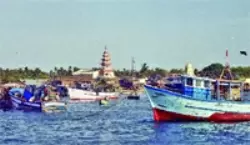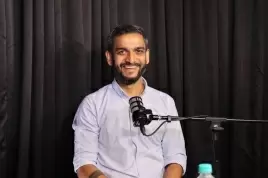‘India needs to review its Sri Lanka policy’

16-February-2012
Vol 3 | Issue 6
Even as the United States has announced its decision to support a resolution against Sri Lanka at the upcoming United Nations Human Rights Council session on the issue of human rights violations, speculations are rife on the possible stand that the government of India would take on this matter.
At the 11th session of the UNHRC in May 2009, India played a vital role in lobbying for Sri Lanka when 17 countries put forward a resolution that deplored abuses by both the Sri Lankan government forces and the Tamil Tigers, while urging the government to cooperate with humanitarian organizations, provide protection to displaced persons, respect media freedom, and investigate attacks against journalists and human rights defenders.
 |
|
The continued attacks by Sri Lankan navy against Tamil Nadu fishermen is straining Indo - Sri Lanka relations (Photo courtesy: Tehelka)
|
Batting for Sri Lanka, India projected the issue as ‘West Vs the Rest,’ claiming that the western countries adopted different yardsticks on the issue of terrorism, and raked up human rights issues against third world countries when they fought terrorism in their soil.
The strategy worked and it garnered the votes of the Latin American, Islamic and erstwhile communist countries in favour of Sri Lanka.
Later, the UNHRC passed a fresh resolution praising the Sri Lankan government’s actions, condemning the Tamil Tigers, and ignoring the allegations of violations of human rights and humanitarian laws by government forces. The resolution was passed by 29 votes to 12 votes with 6 abstentions.
India’s stand on Sri Lanka is supposedly influenced by our geo-political interests in the region. But how successful has India been in getting Sri Lanka to adopt a pro-India line?
Last month, India’s External Affairs minister S M Krishna concluded his so called “successful trip” to Sri Lanka after doling out hundreds of crores of rupees aid to various projects in that country.
Krishna declared that he had sorted out the issue of repeated attacks by the Sri Lankan navy against Tamil Nadu fishermen.
He also said Sri Lankan President Mahinda Rajapaksa had agreed to implement the 13th amendment of their constitution which would lead to devolution of power to the Tamils.
Barely a day after his ‘successful visit’, the Sri Lankan navy attacked Tamil Nadu fishermen, who had ventured into the sea in about 600 boats. About 200 boats were damaged in the attack. Reports said the Lankan navy pelted the fishermen with stones and chased them away.
Such attacks are still continuing, with no solution in sight. It is a shame that a country of the size of Sri Lanka can defy the mighty Indian State and get away with it.
If the attack against the fishermen was a snub to New Delhi, Rajapaksa’s clarification that he had not promised anything to Krishna on the implementation of the 13th amendment and that any new proposal for settling the ethnic issue should come from the Sri Lankan parliament and not any foreign source, was an act of open defiance.
It is time India gets its act together and reviews its policy on Sri Lanka. Will we see a change in India’s position vis-à-vis Sri Lanka at the UNHRC session in Geneva later this month?
The ball is in New Delhi’s court.
The author holds a Doctorate of Philosophy on ‘Internal Displacement and Human Rights situation in Northern Sri Lanka from Bangalore University. He was one of the four public speakers at the Permanent People’s Tribunal on War Crimes against Sri Lanka
Also Read
Inside Sri Lanka: Exclusive
















